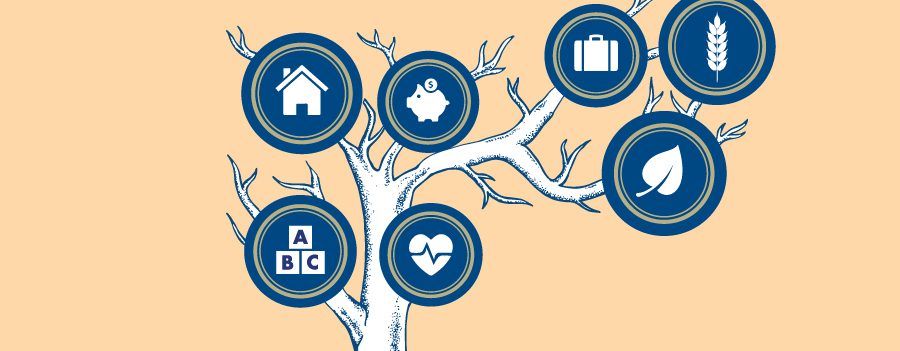Innovative finance is not limited to a specific society, sector or need. Players from various sectors tell us how they use it in their work.
Housing / The Kuyasa Fund
A social development organisation that aims to improve the quality of housing in South Africa by providing micro-finance to low-income homeowners who are excluded from formal finance.
“Kuyasa’s clients are typically women, pensioners, domestic workers and people in informal employment. Most earn under R4 000 per month and 56% earn under R2 000. In the Western Cape, a Reconstruction and Development Programme (RDP) house with no improvements is valued at about R50 000. Typically, after two loans totaling R15 000, a client will have increased their home size from 30m2 to 60m2, and the value to R150 000 to R180 000. The impact multipliers and the fact that Kuyasa has an unblemished record in servicing debt from long-term loan providers are key among the reasons why investors are drawn to the fund.”
Olivia van Rooyen, The Kuyasa Fund Executive Director
Financial Service / Zoona (investment)
An African mobile money operator that helps businesses grow by using mobile technology to address challenges like poor data, transacting in cash, manual stock management and lack of affordable finance.
“We seek to develop solutions that can scale across industries and markets and maximise our positive contribution. Importantly, we want to make money doing it, so impact investment was a good fit when we were raising capital. We were able to find impact investors who took the risk before we had a proven business model because they believed in our mission beyond our financial returns. They also had a much longer-term view because they understood it would take time to achieve.”
Mike Quinn, Zoona Group CEO
Early Childhood Development (ECD) / Innovation Edge (fund)
Launched in July 2014, this fund is a multi-donor partnership between the funding partners of ECD collaborative Ilifa Labantwana in South Africa, and the global Omidyar Network. It is a platform for demonstrating the feasibility and effectiveness of early learning innovations that have the potential to scale.
“Less than a third of young children in South Africa are exposed to quality early learning. Widespread social fragmentation and family disruption also weaken the foundations for early education in vulnerable communities. Innovation Edge is looking for ‘game changers’ in early learning – great ideas that have the potential for scale in vulnerable communities, targeting children from birth to age six years. The Edge is open to innovative products, services and processes, through approaches that are incremental or revolutionary and from organisations or individuals across all sectors.”
Sonja Giese, Innovation Edge Director
Health / African Medicines Impact Fund (AMIIF)
This fund operates in sub-Saharan Africa and invests in unlisted debt by giving loans to private-sector healthcare and pharmaceutical enterprises with a track record of commercial sustainability.
“Kenya and, to a lesser extent, Ethiopia are leading the way with a social-enterprise culture that’s well-suited to healthcare innovation. A number of primary healthcare microclinic chains, pharmaceutical manufacturers and health-insurance startups have been established and are now scaling. We look for investments along the entire value chain, as we know that the various health-system segments are interdependent. This flexibility aims to increase investment impact effectiveness – in allocation of capital and to maximise Social ROI.”
Bartlomiej Dutkowski, AMIIF consultant
Job Creation / The Awethu Project (incubator and investment fund)
A social business that identifies, develops and invests in high-potential entrepreneurs from under-resourced backgrounds in South Africa.
“The sefa Awethu Youth Fund (sAYF) is a R64-million fund established in partnership with the Small Enterprise Finance Agency (sefa). It is arguably the most innovative, socially focused investment fund in South Africa, looking to invest in entrepreneurs through a two-year business leadership academy. Since April 2014, sAYF entrepreneurs have launched over 27 ventures. They’re receiving salaries with performance incentives, world-leading business training and personal development, and dedicated support from Awethu’s team. There is exciting momentum already. After just one quarter, 19 ventures are revenue-positive.”
Rob LeBlanc, Awethu Project Chief Investment Officer
Agriculture / One Acre Fund
This social enterprise invests in rural farmers by supplying seeds and fertiliser, financing, training and market facilitation in East Africa. The aim is to generate a permanent gain in income so farmers can grow their way out of poverty.
“Measuring impact is a key focus at One Acre Fund. On average, farmers working with us realise at least a 100% return on their investment and roughly double income on every planted acre. We attribute this impact to the com- prehensiveness of our model and our ability to distribute products and services within walking distance of the smallholder farmers we serve. It’s growing quickly: we hope to serve one million farmers by 2020 and more thereafter.”
Jenny Best, One Acre Fund spokesperson
Environment / GreenCape (intermediary)
A sector development agency focused on creating a conducive environment for renewable energy project developers, service providers and equipment manufacturers in South Africa’s Western Cape.
“To incentivise investment in renewable energy manufacture, the City of Cape Town has made tracts of industrial land in Atlantis available for sale or lease at preferential rates. Other incentives include fast-track development applications, development-fee waivers and discounted electricity. Global industrial group, Gestamp Renewable Industries’ land-acquisition and R300-million investment in a wind tower factory is the first to be attracted by this scheme. GreenCape is now managing the establishment of a greentech Special Economic Zone (SEZ) in the area with benefits like reduced corporate tax.”
Evan Rice, GreenCape CEO
How can you get involved?
| If you are… | Government | Foundation | High-Net- Worth Individual | Corporation | Institutional Investor | Service Provider | University |
| Then you could… | – Explore options for commissioning or building funds – Commission policy papers – Hold workshops with stakeholders | – Identify partners who are impact investors – Review grantees for potential to offer new innovative forms of financing – Talk to a wealth manager about innovative finance funding options | – Talk to a wealth manager about innovative finance investment options | – Explore how your CSI could start employing innovative financing instead of donations | – Talk to a wealth manager about options involving innovative finance – Review your portfolio for current ESG and sustainable investments | – Identify your capital needs – Speak to current funders about potential forms of finance | – Conduct research into innovative financing – Engage stakeholders through workshops and meetings to identify where more research is needed – Create an innovative finance curriculum |


